Our Office
-
3rd Floor, House No.62, Kotthanur, B.D.A, Santrupthi Nagar, Arekere,
JP Nagar 7th Phase, Bengaluru Urban, Karnataka, 560078

When most people think of marketing, they imagine catchy ads, influencer campaigns,
and viral content. But business-to-business (B2B) marketing plays by a different set of rules.
It’s less about impulse and more about logic.
Less about trends and more about trust. So
what
exactly is B2B marketing—and how do you do it right?
B2B marketing is the process of promoting products or services from one business to another. Unlike B2C (business-to-consumer) marketing, where the goal is to reach individual customers, B2B marketing targets decision-makers inside organizations—like CEOs, procurement heads, or IT managers.
The most important point to note is that a lot of people make purchase decisions on Your goal? Solve a business problem, improve a process, or offer value that justifies an investment.
Understanding how B2B differs from B2C is essential:
To run a successful B2B marketing campaign, you need a few core pillars:
Know who you're talking to. Is it the CTO of a SaaS company? A procurement officer in a manufacturing firm? Understand their pain points, priorities, and what motivates them.
Blogs, whitepapers, case studies, and videos help build authority. Your content should educate, not just sell. Show prospects how you solve real-world problems.
Email remains one of the most effective B2B channels. Use it for nurturing leads, sharing resources, and staying top-of-mind.
For B2B, LinkedIn is gold. Whether it’s sponsored posts, direct outreach, or thought leadership, it’s the platform where business decisions begin.
Your buyers are searching online—make sure you’re visible. Target keywords that align with high-intent queries and promote through paid search if needed.
Your marketing efforts must support your sales team. Regular syncs, shared KPIs, and tools like CRMs ensure no lead gets lost in the pipeline.